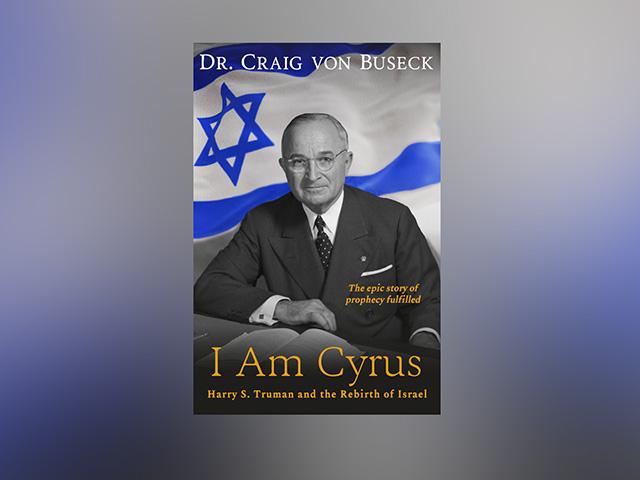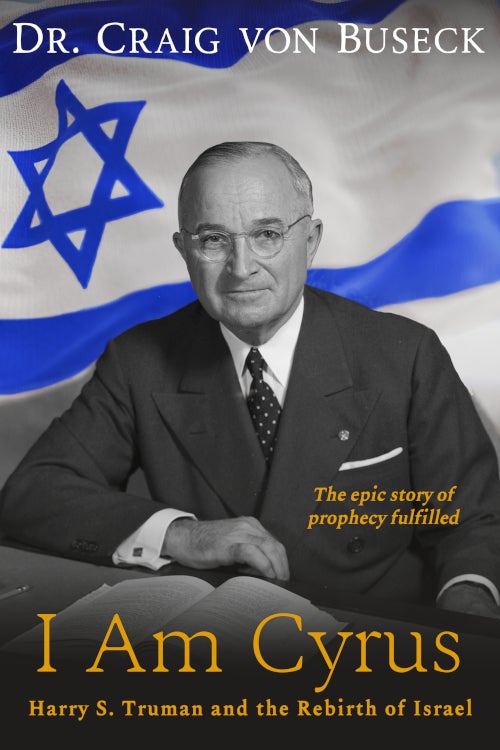Harry S. Truman and the Rebirth of Israel
“I had faith in Israel before it was established, I have faith in it now.” - President Harry S. Truman, May 14, 1948
“Next year in Jerusalem …”
May 1948—Tel Aviv, Eretz Israel
Five Arab armies stood poised on the borders as a wiry, white-haired man rose in the Tel Aviv Museum and proclaimed a new nation for the Jewish people in Eretz Israel after nearly 2,000 years of exile. The date was 5 Iyar 5708, or May 14, 1948. The grizzled leader of the World Zionist Organization, David Ben-Gurion, declared that this nation would be known as the State of Israel.
A radio station broadcast the ceremony and the news streaked like a meteor to the four corners of the globe within minutes. Instantly, Jews around the world reconnected with the ancient home from which their ancestors had been expelled by the Roman Empire in 70 CE. After that national catastrophe, the Jews were scattered to the ends of the earth. From that time forward, at the end of every Passover Seder, Jews collectively uttered their longing with the famous declaration, “Next year in Jerusalem.”'
With Ben-Gurion’s Declaration of Independence, this ancient hope would not merely be a longing of the heart, but a concrete possibility for every Jew with the passion for the Promised Land and the drive to
get there.
The Jews could not forget Jerusalem or the land promised by God to their patriarchs. They had been the majority in this Promised Land from the time of Joshua around 1,400 BCE1 until the Babylonian exile in 597 BCE2—and then again after the return from Babylon until the destruction of the Second Temple in 70 CE.
Persecution in Exile
During the 1,800 years that followed the destruction of Jerusalem, the Jews faced various forms of persecution—most notably the infamous Spanish Inquisition and the Russian pogroms. Yet despite the constant threat to their existence, God’s chosen people endured. A remnant remained in the land they lovingly called Eretz Israel—what the Romans later renamed Palestine.
Then, beginning in the seventeenth century, a more liberal climate swept through Western Europe. In response, many Jews assimilated, embracing the clothing, language, and culture of their adopted nations. Exhausted by the age-old struggle, some even rejected their Jewish heritage and traditions. As a result of their integration into mainstream society, certain Jews rose to levels of wealth and power that previous generations could not have imagined.
The Rothschild family, for example, became prominent in the banking industry, and soon they were known and revered throughout the world. At the height of Queen Victoria’s reign in Great Britain, Benjamin Disraeli ascended to the lofty position of prime minister, wielding worldwide power and influence.
But, as in earlier centuries, the illusion of peace and safety for the Jews in Europe eventually disappeared as old hatreds resurfaced toward the end of the nineteenth century. This was especially true in Tsarist Russia, where Jews lived in grinding poverty in what was called the Pale of Settlement under the cruel hand of the secret police. After the assassination of Tsar Alexander II in 1881, the Russian government blamed the Jews for his murder and unleashed a series of horrific pogroms that shocked the world. In response, many of the Jews of Russia embraced the Hovevei Zion, or Lovers of Zion, movement. Some of these brave souls were pioneers in what became known as the First Aliya—the initial wave of immigrants to Palestine beginning in 1882.
Birth Pains
They were certainly not the first Jewish immigrants, as thousands of Jews had desired to recolonize Palestine for 1,800 years. But these were the first permanent, organized settlements with a dedicated group of pilgrims willing to do whatever was necessary for success. Soon their tenacity caught the attention of a group of wealthy, influential Jewish financiers from around the world willing to spend the significant cash needed to build a successful colony in Palestine.
The Russian Jews who entered Palestine at that time were young, energetic idealists determined to tame the land. The settlement of Rishon LeZion, or First to Zion, was founded on July 31, 1882, by ten pioneers who purchased 835 acres of land southeast of present-day Tel Aviv.
They faced mind-numbing difficulties. The soil was rocky or sandy, water was scarce, marshes were full of malaria, and the settlers had little or no agricultural experience. But after a well was dug, untapping an ample supply of fresh water, more pioneers began arriving—primarily from Russia—and the colony slowly started to grow.
Soon the powerful Baron Edmond James de Rothschild became aware of the settlement and was persuaded to become a benefactor. With his help, major progress was made in the planting of vineyards, in agriculture, and in citrus production. Under Rothschild’s patronage, the Carmel-Mizrahi Winery was established and prospered, gaining fame around the world.
Baron Rothschild said of the project, “Without me, the Zionists could have done nothing. But without the Zionists, my work would have been dead.”
The Jews were now a growing force in their ancient homeland, and soon tens of thousands would join this ragtag early group of settlers.
In 1883, a young Jewish poet from Rishon LeZion penned some verses that she called “Hatikva,” or “The Hope.” Sixty-five years later, her poem became the national anthem of the new State of Israel.3 The words reflect the spirit of the Jewish people who never gave up the hope that they would someday return to the Promised Land of Eretz Israel.
As long as deep within the heart
The Jewish soul is warm
And toward the edges of the east
An eye to Zion looks
Our hope is not yet lost,
The hope of two thousand years
To be a free people in our own land
In the land of Zion and Jerusalem.
To be a free people in our own land
In the land of Zion and Jerusalem.
Around that same time, in the small village of Lamar, Missouri, far away in the middle of the United States, a horse and mule trader named John Anderson Truman rejoiced with his wife, Martha, at the birth of a healthy baby boy. The following day, a famous Baptist circuit rider, Rev. Washington Pease, paid a visit to see the new baby. Without warning, he lifted the newborn and carried him out of the small, dimly lit clapboard house and into the brilliant Missouri sunshine. Lifting little Harry S. Truman into the air, the preacher declared, “Yes, he will be a strong boy.”
Excerpt from I Am Cyrus: Harry S. Truman and the Rebirth of Israel by Craig von Buseck published by Lighthouse Publishing of the Carolinas. Used by permission.







